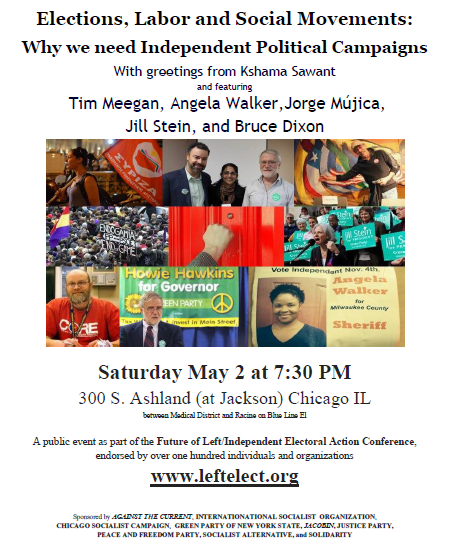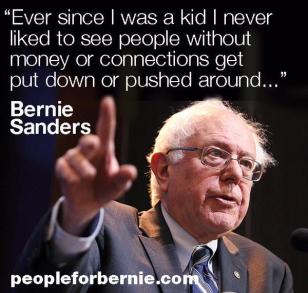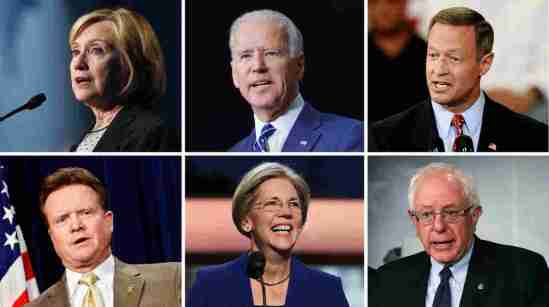The 2008 Democratic presidential primary fight proved that the Clinton machine can be beaten despite enjoying enormous advantages in terms of funding, connections, and name recognition. The question is: can Bernie Sanders repeat in 2016 what no one thought possible in 2008? Although Sanders can’t mechanically follow candidate Barack Obama’s playbook, team Sanders has to adapt some of that playbook’s strategic principles to have a shot at winning.
Tag Archives: Democratic Party
Is the Democratic Party a Capitalist Party? Not Exactly
Mark Lause, in his denunciation of Democratic Socialists of America’s support of the leftmost Democrats, claims that every single Democrat is a “Wall Street flunky.” I must assume that this means that he thinks that every single Democrat is taking cash from finance capital, if not some other corporate source.

Socialist Upton Sinclair — 1934 Democratic Gubenatorial Candidate and Wall Street Flunky?
Top 10 Reasons You Should Vote Bernie Sanders in 2016
Comradely Greetings to the Independent Electoral Action Conference from Bernie Sanders

Dear Friends in Chicago,
I’ve asked my fellow Vermonters Corey Decker and Jeremy Hansen to convey my very best wishes for a productive and successful conference this weekend. We need many more people like you, throughout our country, who are willing to challenge the stranglehold of big money on politics. Continue reading
When Principle Collides with Reality and Common Sense: Socialist Alternative’s Enthusiastic Non-Endorsement of Bernie Sanders
“We will be campaigning with Sanders supporters against the corporate politicians while politically arguing for Sanders to run all-out through the November 2016 election, as a step toward building an independent political alternative for working people.”
This is the conclusion of Socialist Alternative’s wide-ranging and enthusiastic article about Bernie Sanders’ 2016 presidential run. Although it’s a welcome break from the vitriolic sectarian humbug about Sanders peddled by the likes of Black Agenda Report and Socialist Worker, the article doesn’t actually endorse him!

How Fringe and Spoiler Campaigns Hurt Rather than Help Independent and Left Politics
A nasty debate is brewing on the American left over what to do about Bernie Sanders’ campaign for the 2016 Democratic presidential nomination and most of the nastiness is on the anti-Sanders side. Now that Sanders is trending upwards in polls (tripling in Iowa from 5% to 15% and reaching 18% in New Hampshire, two key early primary states) liberals are starting to get hysterical. Articles like “Bernie Sanders Is Already Making It More Likely Republicans Win The White House In 2016” will soon become the norm from this crowd as the primary contest heats up and the Establishment front-runner Hillary Clinton has to defend her Iraq war vote and pro-free trade stance against Sanders’ anti-war, anti-free trade record in six live television debates. Continue reading
Sanders’ Campaign: Shell Game to Save the Two-Party System or Third Party Breeding Ground?
Arun Gupta’s “The Only Article You Need to Read About the 2016 Election” avoids the typical, weak ‘left’ objections to Bernie Sanders’ decision to seek the Democratic Party’s presidential nomination and bases itself instead on undisputable facts — namely, that “progressive challenges [to] the mainstream Democratic candidates” such as Dennis Kucinich in 2004 or Progressives for Obama of 2008 have not dragged the Democratic Party to the left politically but instead dragged progressives and socialists to the right. Gupta’s argument is that this is will be the social function and/or objective outcome of Sanders’ campaign, its socialist gloss and the genuinely oppositional intentions of its participants notwithstanding. Continue reading
Socialist Worker and Hillary Clinton Agree: Bernie Sanders’ Campaign Doomed
“Doomed.”
“No chance of winning.”
These are the words Hillary Clinton’s camp Socialist Worker, newspaper of the International Socialist Organization (ISO), uses to describe Bernie Sanders’ candidacy for the nomination of the Democratic Party in response to a (rather lackluster) endorsement of Sanders by Jacobin which is published by members of Democratic Socialists of America (DSA). The delicious irony of the ISO’s arguments is that they actually want Sanders to run a doomed, no-chance-of-winning presidential campaign, as they readily admit in the same editorial: Continue reading
Can Bernie Sanders Win the 2016 General Election?
Serious questions demand serious answers. To seriously answer the question of whether Bernie Sanders could win the November 2016 election, Sanders supporters must put aside our preferences and partisanship to soberly appraise the likely terrain of the 2016 Electoral College and how Sanders would fit into that context as the Democratic nominee.
Safe and Swing States and Sanders
In the past 6 consecutive presidential races, the Democratic nominee has won 18 states and the District of Colombia for a total of 242 votes in the Electoral College while the Republican nominee has won 13 states for a total of 102 electoral votes. States that vote reliably Democratic (blue states) or Republican (red states) are what’s known in American electoral jargon as “safe states” while the states that could vote in either direction are known as “swing states.” Continue reading
The Case for Bernie: Part 2
By Dustin Guastella
The Democratic Field: Clinton v. Warren v. Bernie
The media have already christened Hillary Clinton as the Democratic nominee. Clinton’s coronation should come as no surprise, as she has positioned herself as a friend of Wall Street (and Wal-Mart). She advocates fiscal discipline and so-called “privatized Keynesianism” and takes her political advice from “the markets.” She prides herself on her role in gutting welfare, her aggressive foreign policy and her close relationships with Republican leaders. Most damning of all: BENGHAZI! I don’t think I have to convince readers of this blog that she is the epitome of a neoliberal Democrat and her candidacy represents what Tariq Ali calls “the extreme center”.
The Case for Bernie: Part 1
By Dustin Guastella
Senator Bernie Sanders has been mulling over a presidential run for the past few months and is set to make an announcement this week or next about his potential candidacy. Bernie, a self-proclaimed and vocal socialist, is a talented campaigner, a remarkably successful politician and broadly popular across the ideological spectrum in his home state. Should he decide to run, socialists need to play an active role in building his campaign, but we also need to think carefully about why a Bernie candidacy is important and how socialists should best support and shape such a campaign. For starters, I don’t think socialists should work for Bernie in the hopes of “reclaiming” the Democratic Party (when was it ours to begin with?). Further, Bernie’s presidential run shouldn’t be seen as a means to pull Clinton to the left, a failing strategy for sure. Continue reading
The Black Political Class and the García Campaign’s Mistakes Re-Elected Chicago Mayor Rahm Emanuel
By Bruce A. Dixon
The results are in, and the truth hurts. Rahm Emanuel will sit in the mayor’s office on the fifth floor of Chicago’s City Hall four more years. Despite fudging police stats to make murders disappear, despite stonewalling on police torture and atrocities, despite deliberately shortening red light camera intervals to raise revenue for his buddies, despite closing and privatizing more than 50 public schools, almost exclusively in black and brown neighborhoods, than anywhere in the country, and despite his facing a solid progressive Democrat challenger, Rahm Emanuel carried every single ward in black Chicago, not by big margins, but by enough. Continue reading
How Upton Sinclair Upended California’s Democratic Party and the Lessons for Bernie Sanders’ 2016 Run
Never in American history has a socialist been elected governor of a state, but in 1934 Upton Sinclair came close. He almost became governor on a program known as EPIC — End Poverty in California.
American socialists typically think of Eugene V. Debs’ 1912 presidential campaign as the high point of their movement since Debs won 6% of the vote, or just over 900,000 votes. Sinclair nearly matched that in 1934 by winning 879,000 votes, some 37% of the electorate. With two dozen EPIC candidates elected to the California legislature in 1934, Sinclair’s 37% was a far more politically meaningful result than Debs’ one-in-a-lifetime single-digit showing.
Despite nearly matching Debs’ power at his peak, the EPIC Sinclair campaign of 1934 has all but disappeared from the historical memory of American socialism. Almost a century later, it is the greatest story never told. These days, EPIC warrants but a single misleading mention by one Leninist journal and seems forgotten by the Democratic Socialist of America, a group that advocates the very strategy Sinclair and his followers pursued in 1934 — capturing the Democratic Party for socialism.
Politically Assessing Year One of de Blasio’s Rule
Democrat (and former self-described advocate of “democratic socialism“) Bill de Blasio has been mayor of New York City for one year having won 73% of the vote (roughly 700,000 votes) in the 2013 mayoral race. The same election saw the city council’s Progressive Caucus double in size and with the council’s 48-to-3 Democratic-to-Republican majority, de Blasio has been able to get a lot done during his first year in office. Assessing these achievements and understanding what de Blasio and his administration represent politically is critical to correctly orienting to the actually existing class and political struggle at the local level. Continue reading




